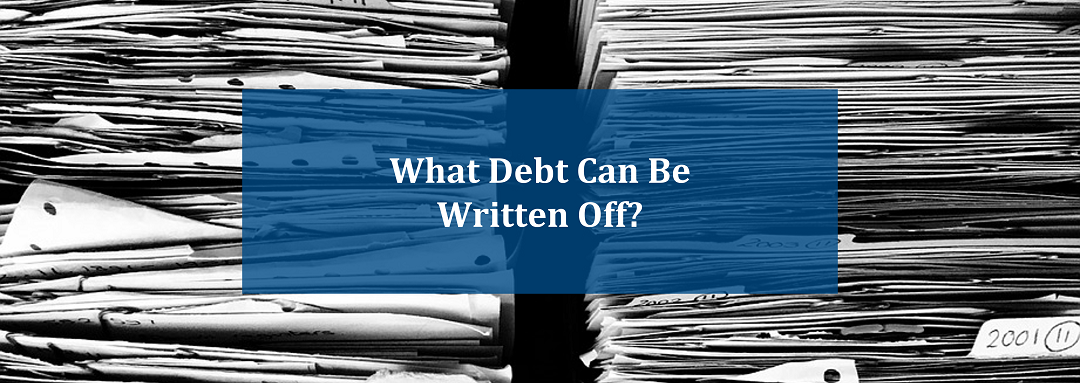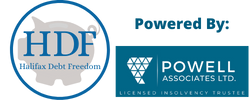What Debt Can Be Written Off – Know Your Options

What debt can be written off is a question that many people struggling with debt ask. What people don’t realize is that nearly every type of debt can be written off. There are only a few exceptions which we will cover later in this article.
A Debt write off can always be granted by the original creditor who lent you the money. They can decide at any point that they will not continue to pursue you to pay them back. While this is rare, it does occur from time to time. What we will discuss in this article are the various methods of writing off a debt that you can initiate that has a much higher chance of success.
Debts can be categorized into two main categories; Secured and Unsecured debts. How they can be written off and the consequences of writing them off depend on which category the debt falls into.
Unsecured Debts
Unsecured debt is debt that has no collateral attached to them. Collateral is simply a physical asset such as a car, a house, or even cash. A good way to know if your debt is unsecured or not is to ask yourself ‘If I stop paying this, will I lose any assets?’. If the answer is Yes, then it is most likely secured, if the answer is No, then it is most likely unsecured.
Some examples of unsecured debts are:
- Consolidation loans
- Payday Loans
- Income Tax Debt (providing a lien hasn’t been placed on an asset for non-payment)
- Most lines of credits
- Most bills (cell phone, internet, etc)
- Most debts assigned to third-party collection agencies
- Overdrafts
- Most Personal Loans
It is important to note that some of the debt types listed above can technically be secured.
Unsecured Debts – How they can be written off
Unsecured debts can be written off in a variety of fashions. Unfortunately, none of the methods are without consequences. The options below all impact credit in one fashion or another.
Credit Counselling – Credit Counselling is the first method that can be used. While this doesn’t technically write off any principle it can be used to reduce the overall interest charges. Credit counselling typically works by paying back 100% of the debt you owe plus a fee to the credit counselling agency.
Informal Settlement – What people often think of when they think about debt getting written off. While this option is effective, it is not always the best choice. The reason for this is because it requires lump sums of money. We wrote an article about the myths associated with debt settlement.
Consumer Proposal – A consumer proposal is a method whereby you pay back your creditors a reduced amount. The debt leftover is written off by creditors which means you usually only pay back a fraction of what was originally owed. A consumer proposal can be a very effective method in dealing with debt while avoiding bankruptcy.
Bankruptcy – The most severe option in dealing with debt and usually provides for the maximum amount of debt to be written off by creditors. Unfortunately, it comes with the longest term impacts. We have written an extensive article on Bankruptcy.
If you are considering a consumer proposal or a bankruptcy and not sure which one to pick please read out article putting a consumer proposal head-to-head with bankruptcy.
In all of these options, the debt is written off by making an arrangement with your creditors to repay the amount owing under terms different than you originally had.
Secured Debts
Secured debts are debts that have collateral attached to them. For example, a mortgage is secured by a house. A car loan is secured by a car. If you ask yourself the same question ‘If I stop paying this, will I lose any assets?’ and the answer is Yes, then it is most likely secured. Secured debts can be secured against any physical asset such as vehicles, property, land, cash, etc.
The two main secured debt types are:
- Mortgages
- Car Loans
However – anything can technically be secured. You could have obtained any of the debt types listed in the Unsecured Debt list and have put up collateral.
So how do you find out if a debt is secured or not? There are two ways: 1. Check your original paperwork, and/or 2. call the creditor who lent you the money and ask.
Secured Debts – How they can be written off
Secured debts are written off very differently than unsecured debts. The reason for this is because they have collateral against them. If you stop paying them, as per the original terms the creditor will have the right to seize the asset. In Nova Scotia creditors are allowed to seize AND sue. What this means if they seize an asset that has negative equity they can sue you for the difference. Negative equity is when the asset is worth less than the debt. This is typical with vehicles. You might own a car worth $10,000 but it has a loan on it for $15,000. If the creditors take the car you would still owe $5,000.
Unfortunately, in most instances, if you wish to have a secured loan written off you will also need to surrender the asset as well. This isn’t usually a problem if there is no negative equity but when there is it can be very tricky.
If you do have negative equity and need to deal with the shortfall there are only two ideal methods to deal with the debt and a third that isn’t ideal but works on occasion.
Ideal Methods
Consumer Proposal – This method can work great if you are wanting to give up the asset and deal with the debt as you can estimate the shortfall and include it in the proposal and deal with it at the same time as other unsecured debt.
Bankruptcy – Because bankruptcy deals with nearly all debt it can also take care of negative equity situations, again you must be willing to give up the asset.
Not always ideal
Informal Settlements – The reason an informal settlement isn’t ideal is that it generally requires a lump-sum of money to settle the shortfall. This means that if you were exploring this option paired with surrendering an asset you would need cash on hand to settle the negative equity and most people have exhausted all available cash trying to survive.
Knowing which option can be tricky. If you run into any issues please reach out for help.
What types of debt cannot be written off?
The types of debts that cannot be written off are few but when they strike you they can create massive problems. Some examples are:
- Fines, penalties, or restitution orders imposed by a court.
- Any amounts owing due to bodily harm, sexual assault, or wrongful death.
- Alimony Debts
- Any type of child support or maintenance debt
- Debts from lieing, cheating, or stealing
- Student loans or apprentice loans where you have been in school (or eligible apprentice) within the last 7 years.
Even if you go Bankrupt these debts will survive. What we have found is that often times these debts are paired with other debts. When the other debts are restructured we find the debts that don’t go away can be dealt with in a more efficient manner.
Debt Write Off FAQ
What does it mean when a debt is written off?
When a debt is written off it essentially means that the creditor no longer will no longer pursue you for the debt. They will typically assign any debt amounts owing to a collection agency. Just because a debt is written off by your original creditor or collection agency the debt is now assigned to doesn’t mean it isn’t payable.
A debt write off is an accounting process but is often confused with the forgiveness of a debt. This isn’t to say that if the creditor decides to write off your debt that you aren’t forgiven, it is just quite rare that this would occur.
Can written off debt be collected?
Yes, when a debt write off occurs, the debt can still be collected by a collection agency. Just because the credit account was written off by the original lender it doesn’t mean the amount isn’t payable. In fact, a creditor who has written off your debt may try and take legal action against you. Of course, they must adhere to any and all laws and regulations when doing so.
What happens when a creditor writes off your debt?
Usually, when a creditor decides to write off your debt, they will assign your debt to a collection agency that will try and pursue you for payment on the account. Any payments they request will usually be made to that collection agency and not the original creditor.
How do I remove a write off from my credit report?
You can usually not remove a write off note from your credit report until it falls off naturally. This usually occurs 6-10 years from the date of last activity depending on the credit bureau and type of credit account.
Can you really write off debt?
Yes, debt can be forgiven by a creditor at any point. However, it is very rare that this would occur. Usually, when a debt is considered a write-off to a creditor or on your credit report it simply means they have processed the debt as a ‘bad debt’ for the purposes of accounting.
Usually, any interest or payments you would owe or have outstanding would still be collectable.
How long before a debt is written off?
Every creditor is different, but most won’t write off the account until 6-12 months from the date of last payment. They will then usually attempt legal action and/or an assignment of the debt to a collection agency.
Do creditors ever write off debt?
Absolutely. It can occur but is very rare.
What is classed as unsecured debt?
Some examples of unsecured debts are:
- Consolidation loans
- Payday Loans
- Income Tax Debt
- Most lines of credits
- Most bills (cell phone, internet, etc)
- Most debts assigned to a collection agency
- Overdrafts
- Most Personal Loans
Is a car loan unsecured debt?
No, a car loan is an example of a secured debt.
What is secured vs unsecured debt?
As described above, the main difference between secured and unsecured debt is that secured debt is usually tied to an asset such as a car or house.
Is rent considered unsecured debt?
In most instances, rent arrears are considered unsecured debt.
What happens if your car is written off?
If your car lender decides to write off your car loan they will have usually repossessed your vehicle. The account in question will still require payments but the outstanding amount owed will usually be the loan balance that existed prior to the repo minus the amount the vehicle sold for plus any expenses incurred by the creditor.
This article was written by David Moffatt, a Debt Relief Expert. He has helped assist in creating plans that have helped save Nova Scotia residents over $30 million dollars of consumer and tax debt since 2015. We believe that no consumer should have to struggle with the stress of overwhelming debt. Our debt restructuring strategies can help you cut your debt by up to 80%.
If you are struggling with debt please reach out. It hurts to continue to suffer financially. Halifax Debt Freedom services Halifax, Dartmouth, Bedford, Sackville the entirety of HRM, and all of Nova Scotia.

